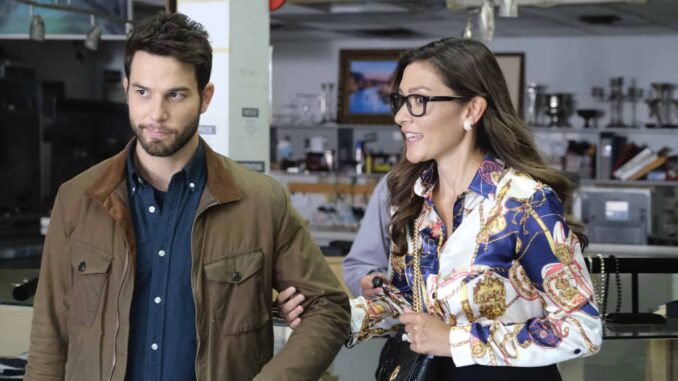
The Ghost of a Season: Scott Prendergast and the Unspooled Future of So Help Me Todd
The cancellation of a beloved television show leaves a peculiar void, a narrative black hole where anticipated arcs and character evolutions simply cease to exist. It’s the lamentable phenomenon of the premature curtain call, leaving audiences with the lingering question: what if? For fans of So Help Me Todd, the vibrant, intergenerational legal dramedy starring Marcia Gay Harden and Skylar Astin, that "what if" was particularly sharp. The show, with its delightful blend of sharp wit, genuine heart, and the chaotic charm of a mother-son duo navigating both the courtroom and their complicated relationship, had found its rhythm. Then, in the blink of a network decision, it was gone.
Yet, a fascinating, almost spectral comfort arrived in the form of creator Scott Prendergast’s revelations about what would have transpired in Season 3. These aren't mere plot spoilers for a show that will never be; they are, in essence, the ghost limbs of a narrative, felt by those who loved it, suddenly made visible. Prendergast’s unspooling of the planned future transforms the raw grief of cancellation into a poignant, bittersweet act of collective imagination, allowing fans to mentally stitch together the season that was destined never to air, and in doing so, illuminates the very nature of storytelling, creative vision, and the enduring power of what could have been.
The appeal of So Help Me Todd lay in its unique premise: Margaret Wright, a formidable and meticulous lawyer, hires her wayward, disbarred private investigator son, Todd, to work for her firm, much to his chagrin and her exasperation. Their dynamic – a tightly wound mother constantly trying to rein in her impulsively charming son – was the show's beating heart. Viewers invested not just in the weekly cases, but in the slow, often hilarious, evolution of their professional partnership and personal understanding. What would happen when Todd finally fully matured? Would Margaret ever truly let loose? Would Allison, the often-overlooked middle sibling, find her own spotlight?
Prendergast’s revelations offered concrete answers, turning the amorphous "what if" into tangible narrative constellations. We learned of Todd’s growing independence, perhaps finally moving out of his mother’s apartment, a significant milestone that would have forced both characters to redefine their boundaries and roles. This wasn't just a physical move; it represented the culmination of Todd's journey towards self-sufficiency, a theme central to his character arc from the very beginning. Imagine the comedic attempts at setting up his own (likely chaotic) bachelor pad, juxtaposed with Margaret’s thinly veiled pride and perhaps even a touch of loneliness.
Then there were the hints at Margaret’s professional and personal life. The potential for her to take on more high-profile cases, perhaps even grappling with a new, complex romantic interest, would have provided fertile ground for her own growth. For a character so defined by her professionalism and her role as a mother, seeing Margaret navigate a richer personal landscape would have added layers to her already intricate persona. Prendergast might have outlined a specific, high-stakes legal battle that would challenge her ethical boundaries, forcing her and Todd to collaborate in an unprecedented way, pushing their partnership to its limits and strengthening it in the process.
Beyond the central duo, the creator’s insights would have sketched out the trajectories of the supporting cast. Allison’s path, perhaps pursuing a new career or finding renewed purpose outside her conventional life, would have offered a much-needed spotlight on the often-underestimated character. The family patriarch, Peter, and Lyle’s burgeoning relationship with Francey, all would have found resolution or evolution. These details, whether specific plot points or broader character beats, are the narrative scaffolding that fans craved. They are not just revelations; they are a blueprint for a future that was planned, carefully constructed by the very mind that brought the show to life.
The significance of Prendergast’s act transcends mere fan service. It is a profound acknowledgment of the shared investment in a story. By revealing what would have happened, he offers a peculiar form of closure. It’s not the closure of a completed season, neatly tied with a bow, but the closure of understanding the creative intent, of witnessing the full breadth of the artistic vision, even if only in hypothetical form. It allows fans to construct their own mental Season 3, populating it with the revealed plot points, imagining the dialogue, the comedic timing, the emotional beats that would have unfolded.
In this way, Prendergast’s revelations are an illustrative essay in themselves – on the ephemeral nature of television, on the passion of creators, and on the enduring human desire for narrative completion. They are a testament to the power of a story to linger, to continue evolving in the minds of its audience, even when its on-screen life is prematurely snuffed out. The ghost of So Help Me Todd Season 3, made visible by its creator, doesn't haunt us with what was lost; instead, it invites us to participate in its enduring life, played out in the infinite theatre of imagination, a testament to a vibrant vision that, though cut short, refuses to truly die.
